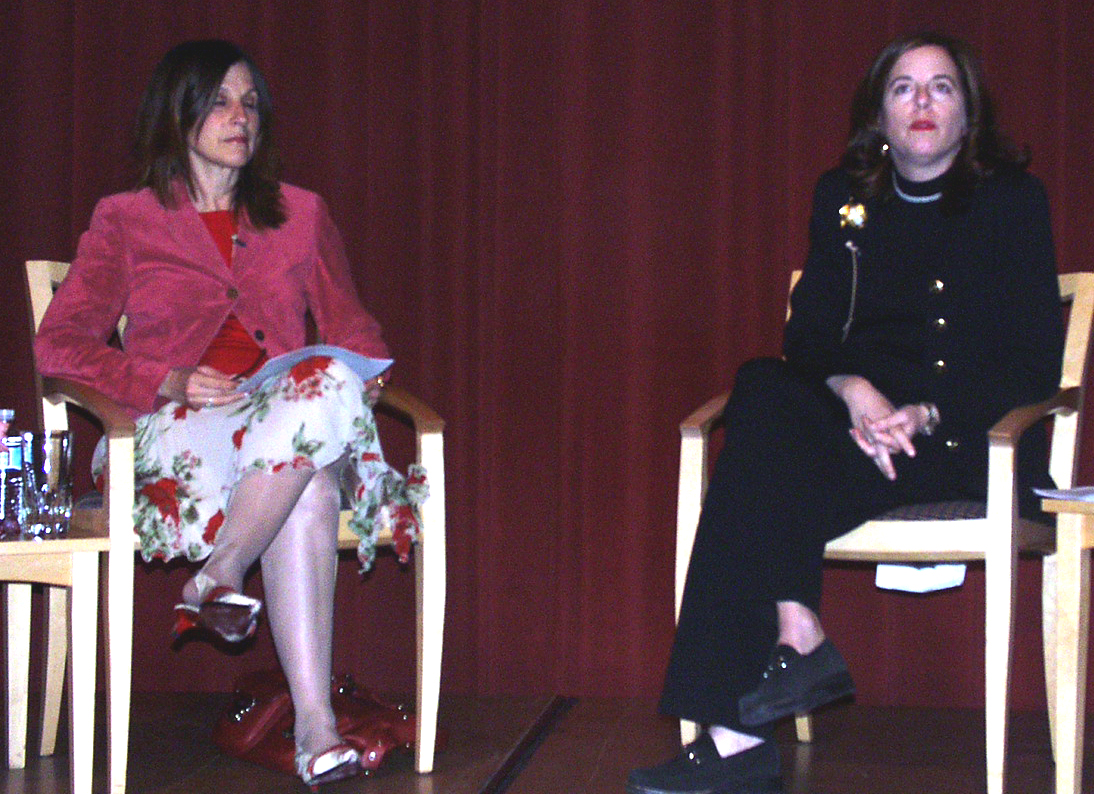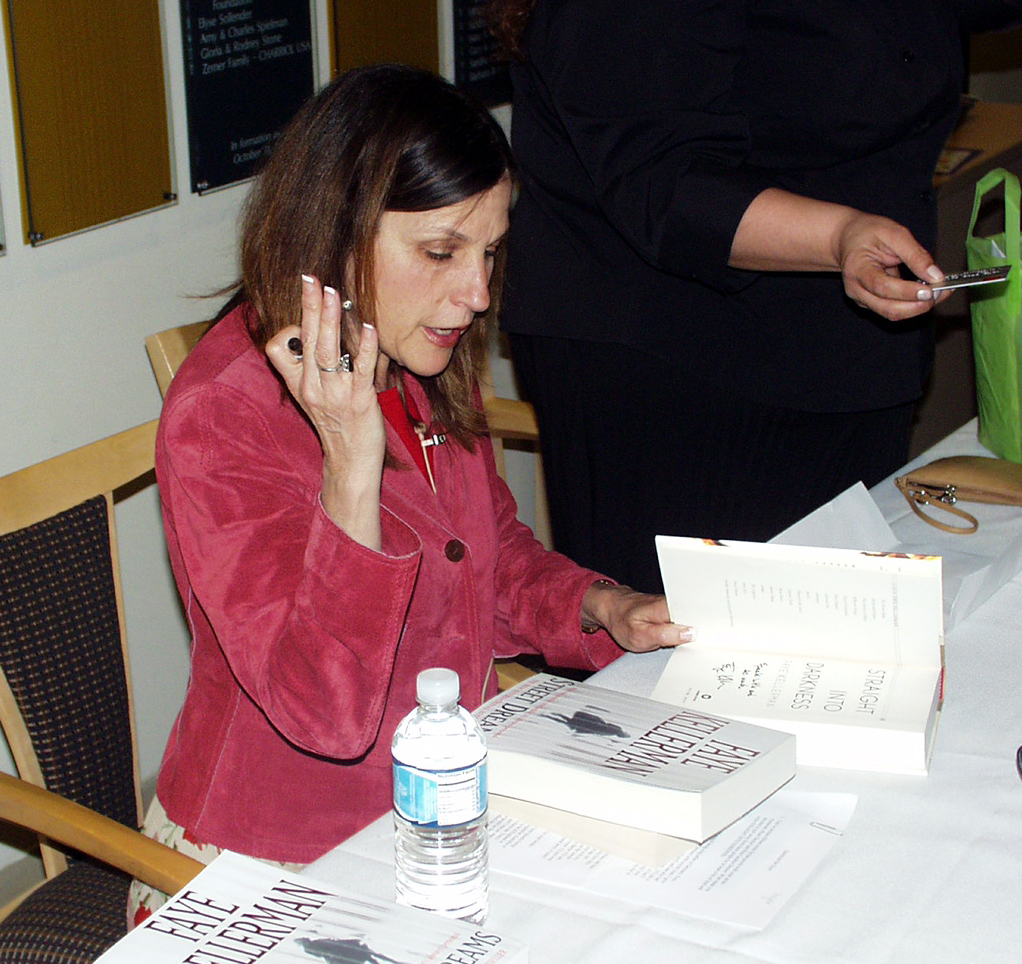|
By Donald H. Harrison
LA JOLLA, Calif.—Sometimes facing your fears can pay dividends.
Mystery writer Faye Kellerman, an Orthodox Jew, not only never wanted to go to
Germany, but like her father she avoided all things German. She gave the labels
of food products double scrutiny. First she'd check the hechscher,
then she'd check what country the product was imported from. If it were from
Germany, it would go back onto the shelf.. Of course, she wouldn't set
foot in a Volkswagen dealership.
On the other hand, Germans loved Faye Kellerman. They enthusiastically
purchased her novels featuring Los Angeles Police Lieutenant Peter Decker and
his wife Rina Lazarus. They wanted her to come to Germany on a book
tour. Moreover, Kellerman's agent really wanted her to go to
Germany. So at last she relented, flying first to London's Heathrow
Airport to catch a connecting flight to Berlin. Sitting in the lounge,
waiting for her flight, she realized that all the people around her
were speaking German.
 "I
became very nervous," she recalled to an audience Thursday
evening, March 23, at the Lawrence Family Jewish Community Center, where she was
interviewed on stage by Julie Potiker, an underwriter of the Distinguished
Authors Series. She said she began to wonder whether she would pass—would
the Germans look at her and think that she was Aryan or know that she was a
Jew? Her sense of paranoia did not decrease when she arrived at her hotel,
parted the window curtain and found herself looking at the Brandenburg Gate, a
symbol of Nazi Germany if ever there were one. "I
became very nervous," she recalled to an audience Thursday
evening, March 23, at the Lawrence Family Jewish Community Center, where she was
interviewed on stage by Julie Potiker, an underwriter of the Distinguished
Authors Series. She said she began to wonder whether she would pass—would
the Germans look at her and think that she was Aryan or know that she was a
Jew? Her sense of paranoia did not decrease when she arrived at her hotel,
parted the window curtain and found herself looking at the Brandenburg Gate, a
symbol of Nazi Germany if ever there were one.
Faye Kellerman and Julie Potiker at Lawrence Family JCC
She had arrived in Berlin on a Thursday and her first speaking engagement was on
a Sunday. Her hosts took her on tour of Berlin's Jewish Museum
designed by Daniel Libeskind, the second-generation Holocaust Survivor more
recently chosen to design the new World Trade Center in New York. Then
came Shabbat and Kellerman said she attended services at a shul where the siddurim
were printed either in Hebrew and German or Hebrew and Russian. It was
an Ashkenazi service, she was familiar with all the prayer melodies, and
"it was like home."
Book talks in Germany were surreal. Kellerman would read in English,
then a German television actor—who reminded her of Tom Selleck playing the
role of Magnum P.I.—would read a translation in German. The audiences
were almost exclusively non-Jewish. "I felt Hitler would be rolling in his
grave."
And, everywhere she went, she saw memorials to Holocaust victims. A plaque
in front of a house saying here so-and-so and his family were arrested .
On this spot, Jews were assembled... Her feelings about the ever-present
reminders of the Holocaust were ambivalent. On one hand, it was good that
the Germans would never forget, but on the other hand "maybe it's not good
to make people feel guilty."
One of her eeriest moments in Germany was a visit to the Dachau
Concentration Camp. "You take the bus, and you get off where it
says 'Dachau'—How do you think that makes you feel?" she asked the
audience made up mostly of Jews from the San Diego area.
Dachau was a place like the one that her father never would talk about. An
immigrant to the United States at age 5, he served in the United States
Army during World War II. Because he spoke Yiddish, he was assigned as an
interpreter for the Jews who survived a concentration camp—Buchenwald,
his mystery writer daughter later found out. What he saw at
Buchenwald was a closed subject. In this way, American liberators, especially
the Jewish ones, and Holocaust survivors had a common bond. There were
things they wanted to forget, but couldn't.
 During
question and answer sessions with her German audiences—or at the tables where
she signed books following her lectures—the people never brought up the issue
of the Holocaust, Kellerman said in response to a question from Potiker.
The fans asked about her mystery novels. But members of the German news
media always asked the question, albeit circumspectly. How do
you feel about being in Germany? The first time she heard the
question, Kellerman froze. That awkwardness "forced me to organize my
thoughts," she recalled. "I came up with an answer that
was somewhat satisfying." She told the reporters that "I don't
hold a grudge against the German people as I thought I might, but I feel like I
am walking on a bone yard." During
question and answer sessions with her German audiences—or at the tables where
she signed books following her lectures—the people never brought up the issue
of the Holocaust, Kellerman said in response to a question from Potiker.
The fans asked about her mystery novels. But members of the German news
media always asked the question, albeit circumspectly. How do
you feel about being in Germany? The first time she heard the
question, Kellerman froze. That awkwardness "forced me to organize my
thoughts," she recalled. "I came up with an answer that
was somewhat satisfying." She told the reporters that "I don't
hold a grudge against the German people as I thought I might, but I feel like I
am walking on a bone yard."
The idea for her latest novel, Straight Into Darkness, came to her while
she was on tour. Why not write a mystery novel set in Germany—not just
anywhere in Germany, but in Munich in the 1920s, when and where Hitler got his
start. She conceived a non-Jewish detective hero, Axel Berg, who was "very
precise, Teutonic." The case would come out of the period in
Germany after World War I when, she said, there were a lot of serial
killings and sexual killers.
As the plot lines of Kellerman's latest novel began to take shape, it became
clear that she would have to return to Germany to conduct the kind of research
necessary to demonstrate Axel Berg's familiarity with every aspect of
Munich. With the help of researchers, she found out the routes of the
street car lines, the gas lines, and the other minutiae that give a good
detective novel its air of verisimilitude. And she interviewed
people who had grown up during the time Hitler was coming to power, including
one member of the White Rose resistance group. From him, she learned that the
dictator had a habit of squeezing a roll into crumbs in his hand as he
gave his speeches—with a lackey sweeping up after him.
Germany was an intensely emotional experience for Kellerman, and her
return to the Peter Decker/ Rina Lazarus novels that made her famous was a
relief. Those two recurring characters have become so real to her, it is
as if they have lives of their own. There are times, she confided, when
she is writing a line, and "Peter will say to me, 'I wouldn't say something
like that, Kellerman.'"
Not so with her German detective hero, Axel Berg. It's unlikely that he too
someday will be able to protest, Das ist mich nicht, Frau Kellerman!
|

